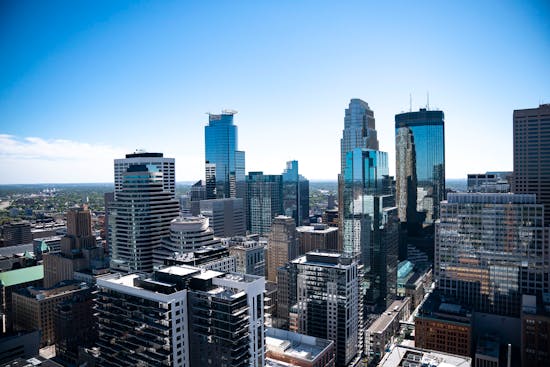Opinion editor's note: Star Tribune Opinion publishes a mix of national and local commentaries online and in print each day. To contribute, click here.
•••
Over the last year numerous news stories and opinion pieces have lifted up a "new vision" for downtown Minneapolis. As leaders of organizations bringing together thousands of people who work in downtown Minneapolis, we agree change is needed. But we firmly believe that real change won't happen unless the people most directly impacted have a seat at the table.
We must move beyond the traditional voices that exclude the expertise and vision of the workers who keep downtown alive. The voices of our Black, brown and immigrant worker communities must be at the table in deciding what is next for our city.
We are clearly at a point where we need a new vision, a new plan, for revitalization for downtown Minneapolis. Anyone walking downtown will see that there simply aren't the same number of people, stores and tenants as before. A downtown area is meant to feel vibrant, and right now that isn't the case in Minneapolis.
It isn't the scary doomsday tale people who have never visited want to tell you, but it isn't what it could be.
Yet we need to be careful about pining to go back to "normal." Even before COVID, even during its "heyday," what was happening in downtown Minneapolis was not working for everyone. It was unaffordable for the members of our organizations who work downtown to live or play in the area they came into every day to clean, protect and serve others.
What does it say when you come to an area to clean buildings housing billion-dollar corporations, but then have to take the bus to the suburbs, which are the only place you can find affordable housing? What does it say when you protect buildings that house music venues and restaurants, or sell food in the skyway, but your wages would never allow you to visit these same places?
Our members are mostly immigrants and persons of color, and downtown is run on their backs. Yet they increasingly can't afford to spend time there except to work. The people who are now talking about how to "fix" downtown so often leave out our members when deciding our collective future. Decisions are often shortsighted and made with profits in mind, even if they are bad ideas that are going to make things worse and cause us all to lose. We want to scream: "Talk to people on the ground and listen to regular people who have great ideas on how to fix things!"
The reality is, this model of boom and bust is costing all of us. Unless we make serious efforts to radically transform and build something that works for all, and isn't as focused on profit or short term commercial real estate industry trends, our tax dollars will continue to rebuild and "fix" downtown exclusively for the wealthy.
An equitable downtown looks like our community. It would mean people and their families from every race and socio-economic background could make the downtown area their home. It wouldn't just be making certain parts of the city into a playground for high end stores and restaurants, with wide swaths just left to gather dust (or worse).
It would mean talking to people to find real solutions to safety that address the current concerns and also work to fix the underlying problems that are causing these issues. It would bring together family-focused affordable housing, entertainment that attracts people to come downtown, and real plans to turn the changes in office buildings into useful venues for people to live, work and play. It would mean making downtown an engine to drive growth and heal the inequality and divisions in our community, not drive them further apart.
Our members are ready and have the expertise to be part of these conversations. They've seen the good, the bad and the ugly of the status quo of downtown Minneapolis over the last decade. They want to be part of the process to make the critical part of our city more vibrant and welcoming, and they want to be able to afford to live and spend time here outside of their daily commute.
As we do in our work every day, we are going to be pushing to get real people to the decisionmaking tables as these conversations go forward. We need to have everyone engaged, and we can't leave behind the people who have so much vested interest in the success of Minneapolis.
Brahim Kone is the secretary-treasurer of SEIU Local 26, a union of property service workers in the Twin Cities. Veronica Mendez Moore is co-founder and co-director of the Twin Cities worker center CTUL (Centro de Trabajadores Unidos en la Lucha).



